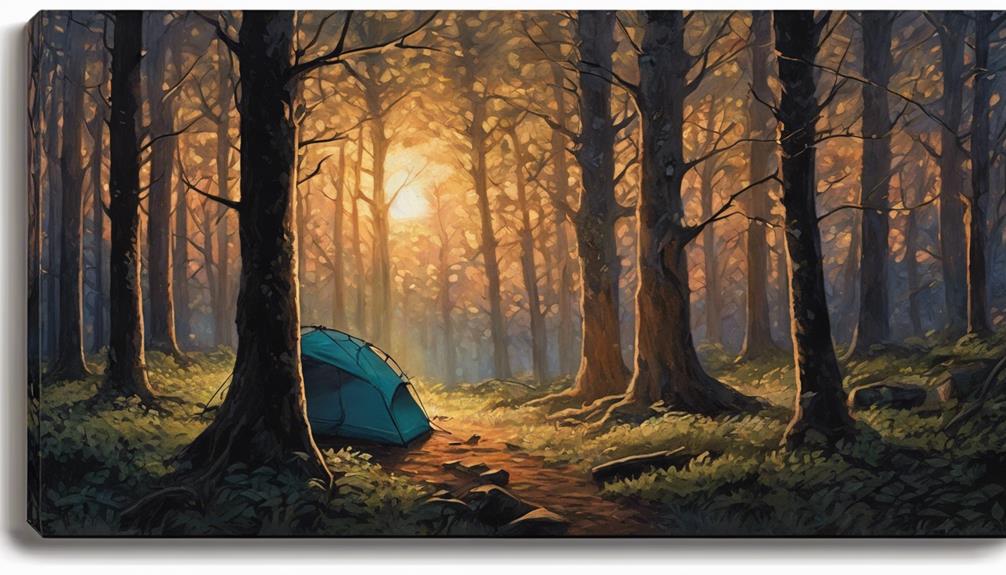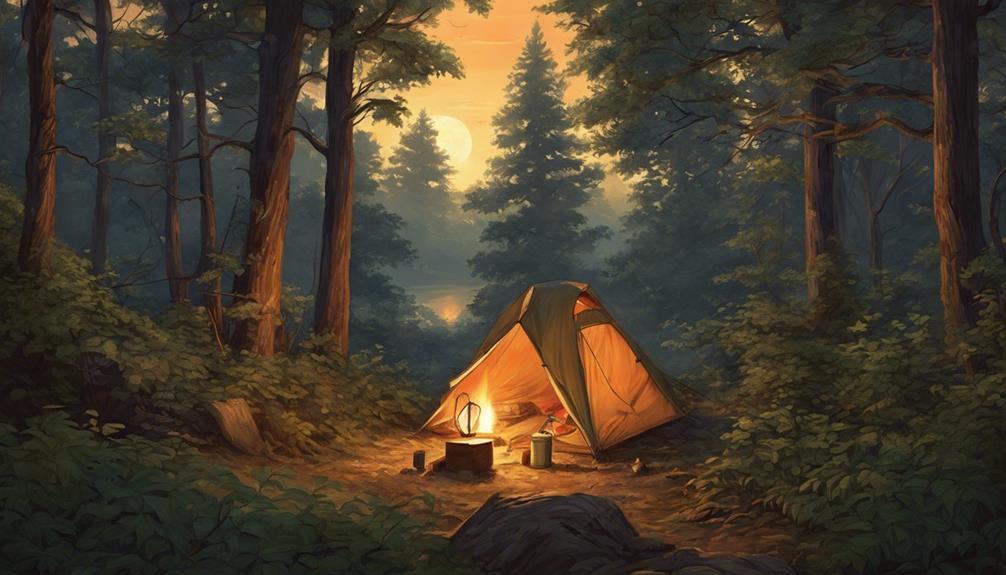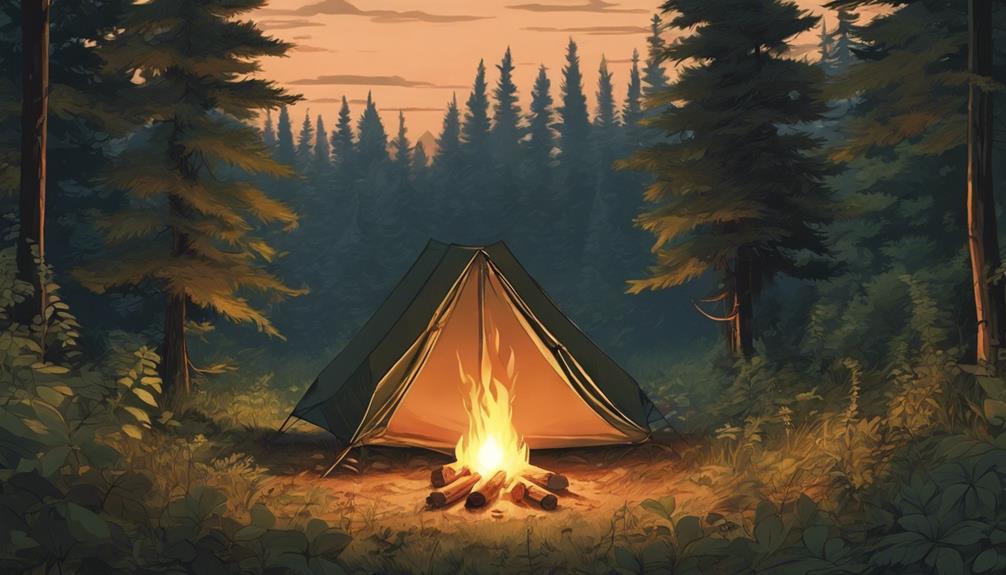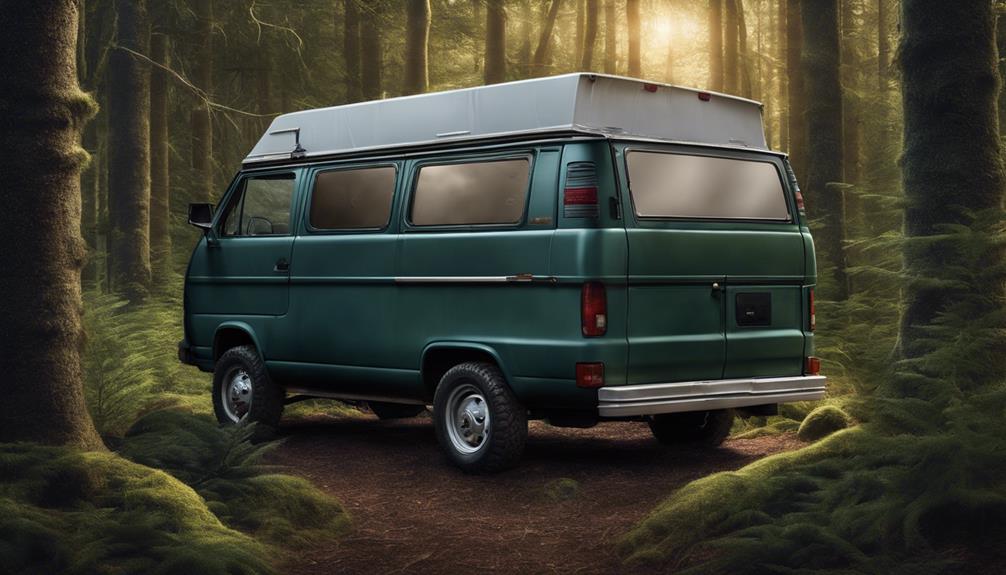When camping stealthily in the forest, it is crucial to blend in with the surroundings. Choose equipment in natural colors and incorporate elements like branches for optimal camouflage. Look for low-impact camping spots away from paths and bodies of water, and keep noise levels to a minimum to avoid being noticed. Use small fires or portable stoves for cooking, and consistently follow Leave No Trace guidelines.
These five tips are just the beginning of mastering stealth camping in the woods.
Key Takeaways
- Choose gear in earthy colors and natural materials for effective camouflage.
- Select a low-impact campsite away from trails and water sources for concealment.
- Maintain noise and light discipline to avoid detection.
- Use a small, contained fire or portable stove for cooking to reduce visibility.
- Follow Leave No Trace principles by packing out trash and respecting wildlife.
Camouflage Techniques
When stealth camping in the woods, it's crucial to master effective camouflage techniques to blend seamlessly with the natural environment and remain undetected. To achieve this, we must carefully choose our wild camping gear, ensuring that it consists of earthy and natural colors such as browns, greens, and greys. These colors help us stay hidden in the forest while avoiding flashy or reflective materials that could give away our position. Additionally, breaking up our silhouette by incorporating branches, leaves, or other natural elements into our gear can further aid in our camouflage efforts.
For those looking to take their stealth camping skills to the next level, investing in camouflage netting or a ghillie suit can provide even more concealment in the woods. These advanced camouflage techniques not only help us stay hidden but also contribute to leaving no trace behind, a fundamental principle of urban camping.
Low-Impact Campsite Selection
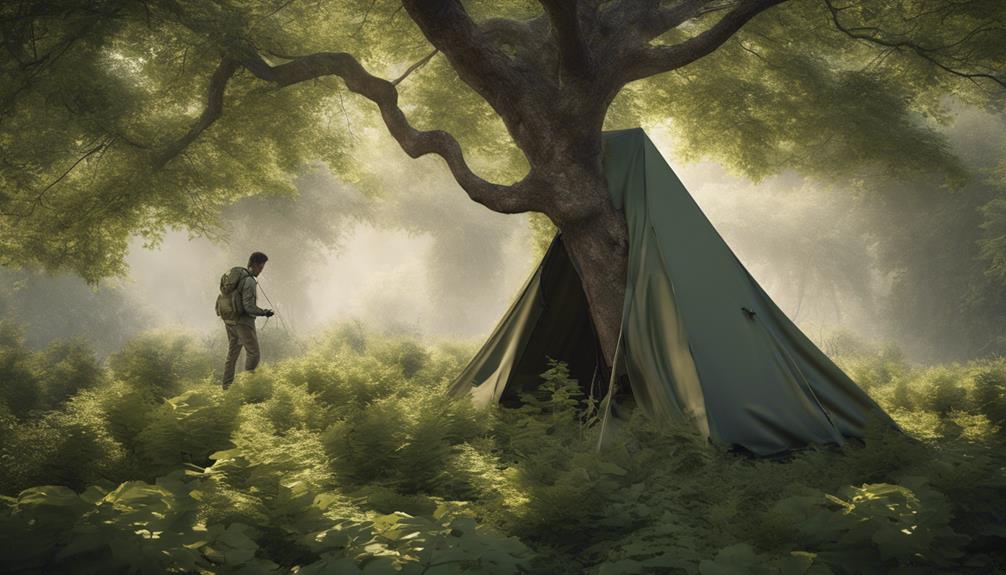
To minimize our environmental impact while stealth camping in the woods, selecting a low-impact campsite is crucial for preserving the natural landscape. When choosing a spot, it's essential to consider the wild surroundings and aim to blend in seamlessly.
Look for areas away from trails and water sources to minimize disruption to the ecosystem. Seek out natural cover such as dense vegetation or rock formations to conceal your campsite effectively. Avoid clearing vegetation or altering the landscape, as this can have lasting effects on the environment.
Setting up camp during daylight hours allows for a thorough assessment of the surroundings, ensuring minimal impact and disturbance. Remember to leave no trace by packing out all trash and belongings, leaving the campsite as undisturbed as possible.
Noise and Light Discipline
Maintaining a quiet demeanor and utilizing dim red light sources are essential aspects of practicing noise and light discipline while stealth camping in the woods. To ensure you stay hidden and undetected, here are some practical tips:
- Noise Discipline: Move quietly and avoid unnecessary activities that could create loud sounds. Even the rustling of gear or loud whispers can give away your position in the silence of the woods.
- Light Discipline: Use red light filters on your flashlights to reduce visibility at night while still allowing you to see. Avoid using bright white lights that can easily be spotted from a distance, compromising your stealth.
- Equipment Security: Secure all your gear properly to prevent accidental noise or light disturbances. Make sure everything is in its place and won't shift or make noise when you move around your campsite.
Fire and Cooking Considerations
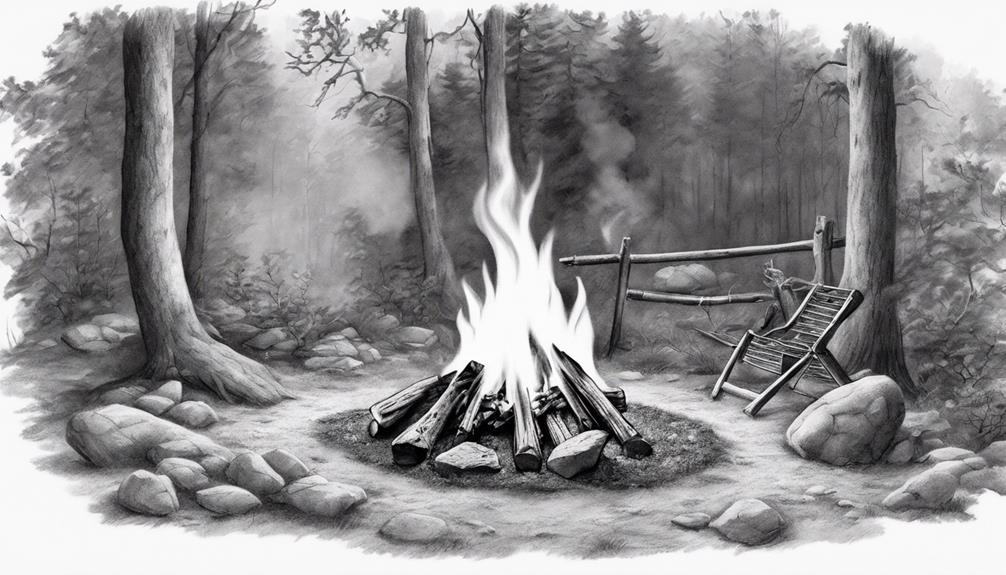
For optimal stealth during your woods camping experience, utilizing a small, contained fire or portable stove is key to minimizing smoke and light emissions. When selecting a spot for cooking, it's crucial to choose a location away from your main camping area to reduce visibility.
Opt for low-odor foods to avoid attracting wildlife or unwanted attention, thus enhancing your privacy and safety. After cooking, make sure to extinguish the fire completely and scatter the ashes to leave no trace of your cooking activities, ensuring that you remain hidden from potential threats.
Additionally, consider using a windscreen to control flames and reduce light dispersion during cooking, further aiding in your efforts to stay concealed. By taking these precautions and being mindful of your surroundings, you can protect yourself from the elements, wild animals, and potential encounters with private property owners while maintaining a low profile in the woods.
Leave No Trace Principles
Minimizing your impact on the environment while camping in the woods involves adhering to Leave No Trace principles, which are essential for preserving the natural beauty of wilderness areas. To help reduce your footprint and ensure a sustainable camping experience, consider the following:
- Proper Waste Disposal: Always pack out what you pack in. Dispose of trash and waste responsibly to keep the camping spots clean and pristine for the next visitors.
- Respecting Wildlife: Keep a safe distance from animals and refrain from feeding them. By respecting wildlife, you help maintain their natural behaviors and prevent any potential conflicts that could arise.
- Leaving No Trace: Avoid altering the environment. Refrain from building structures or digging trenches that could impact the natural landscape. Leaving natural features undisturbed ensures that others can enjoy the wilderness in its full-time glory and beauty while staying safe.
Frequently Asked Questions
How Do You Stealth Camp in the Woods?
To stealth camp in the woods, we choose secluded spots, utilize natural barriers, avoid attracting attention with lights or noise, set up during low light, and clean up thoroughly. These tactics ensure our safety and environmental respect.
How Do You Hide a Camp in the Woods?
To hide a camp in the woods effectively, we choose sites with natural cover, avoid visible trails, use camouflaged gear, set up away from popular areas, and maintain low noise and movement levels. These tactics ensure our camp remains discreet and undetected.
How Do You Get Away With Stealth Camping?
How do we get away with stealth camping? By choosing remote locations, minimizing noise and light, utilizing natural camouflage, containing fires, and leaving no trace. Our method ensures a hidden campsite for a serene wilderness experience.
What Are the Rules of Stealth Camping?
We know the rules of stealth camping well. Understanding local regulations, practicing leave no trace principles, and minimizing noise are key. Staying hidden involves being discreet, leaving early, and respecting the environment.
How Can Stealth Camping Tips Help with Staying Safe Outdoors?
When it comes to staying safe outdoors, essential survival tips are key. Stealth camping is a great way to enjoy the wilderness without drawing attention to yourself. By following these essential survival tips outdoors safety, such as choosing a discreet campsite and minimizing your impact on the environment, you can ensure a safe and enjoyable camping experience.
Conclusion
In conclusion, mastering the art of stealth camping in the woods takes practice, patience, and a keen eye for detail. By utilizing camouflage techniques, choosing low-impact campsites, maintaining noise and light discipline, being mindful of fire and cooking considerations, and following Leave No Trace principles, you can successfully stay hidden and undetected in the wilderness.
So, are you ready to test your skills and see if you have what it takes to become a stealth camping expert?

